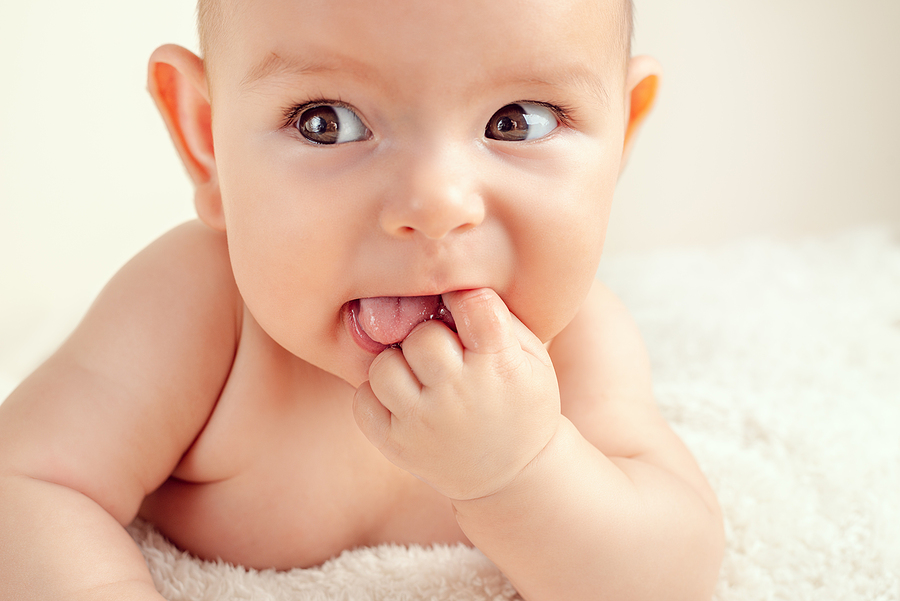Any parent whose child has gone through teething knows that it often comes with many a sleepless night spent caring for a cranky, tearful, and irritable baby.
Teething is an unavoidable physical milestone where a child’s first teeth gradually erupt between 6 and 12 months (and it’s usually followed by baby’s first dental appointment).
While an exciting milestone for mum and dad, it can be quite unpleasant for babies – they’ll often experience itchy and sore gums when a tooth starts erupting.
As a parent, you’ll need to know how to soothe your baby\’s sore gums and ease their pain when this happens.
How? We’re glad you asked – if your baby’s reaching teething age, we suggest reading through this list of suggestions and tips, courtesy of our Armadale dental team.
What are the common symptoms that a child is teething?
If you are a first-time parent, you\’ve probably wondered the cause behind your child\’s sudden irritability and discomfort.
There are a lot of potential candidates, as you’ve no doubt found out the hard way. If they’re around teething age however, it’s probably their first teeth coming out.
Here are some of the most common signs and symptoms that your child is experiencing teething:
- Chewing and munching on any object
- Tender and sore gums
- Irritability and discomfort
- Excessive drooling
- Fever or only high temperature
- Diarrhea
- Decreased appetite
What is the best way to soothe sore gums?
Since it’s something that can’t be dodged, it’s important that parents know what to do to soothe your child\’s sore gums when they start teething.
Pain and discomfort associated with teething can be quite difficult to deal with, especially at night.
However, there are some practical ways for you to deal with sore gums due to teething…
1. Massage your baby\’s gums
Not all babies will take to this – if yours doesn’t seem to mind however, this could be worth a shot!
Applying gentle pressure on your baby\’s gums to the specific areas where you can feel a tooth erupting may be able to ease the pain that your child is feeling.
Just remember not to go at it too hard – baby gums are sensitive, after all, so be gentle!

2. Use teething rings
Picture your family dog’s chew toys, and that\’s essentially what a teething ring does.
In addition to irritation, one of the many side-effects of teething is a stronger drive to bite, chew and munch.
Babies in this stage tend to be more eager to look for things they can test out their new teeth on!
These large rings do just that, while their size ensures that you won’t need to worry about your child ingesting something that they shouldn’t.
On top of giving them something to occupy their attention, teething rings can also help the teeth erupt by helping teeth penetrate the gums.
3. Get an over-the-counter remedy
If you suspect your baby is suffering a fever due to teething, you can get a child-friendly over-the-counter remedy such as Panadol or Nurofen to help ease the pain.
Of course, when in doubt, it is best to consult your doctor or your local Armadale dentist to ensure it is safe and appropriate.
4. Keep an eye on what your child is putting into their mouth
Typically, teething happens to coincide with the period in a baby’s life where all of a sudden they develop the urge to bite and chew literally anything!
With that in mind, it’s crucial that you keep a close eye on what your child eats or puts into their mouth.
In particular, be careful when it comes to teething necklaces.
While teething rings are a great way to soothe sore gums, teething necklaces and bracelets carry with them a risk of choking or strangulation.
Keep an eye on baby and ensure they’re not putting anything in their mouth that is dirty or a choking hazard.
How to care for my child\’s teeth
These tactics can be a big help in managing the symptoms and unpleasantness that come with teething – however, they don’t eliminate the need to look after your child’s teeth once they erupt!
The age when you expect their baby teeth to come out can vary – some may come before they turn one, others may appear before their second birthday.
In most cases however, you can expect their full set of baby teeth to fill their mouth by the age of 3.
After this, your focus as a parent turns from managing symptoms associated with teething to looking after their new teeth and instilling good habits!
Of course, baby teeth are a little different from adult teeth, to say the least – and as such, taking care of them requires a little extra thought…
Start cleaning their gums – before teeth erupt
Before they’re able to use a brush, you need to kick-start the habit of good oral hygiene.
And the key to that is starting early.
Cleaning your child’s gums before the teeth themselves have erupted doesn\’t just build good habits, but it can also relieve some of the discomfort that occurs in the lead-up to teething – think of it as a soothing massage!
Use a clean and wet cloth to wipe the front and back part of their gums around where the teeth will erupt. This method is much gentler than a toothbrush.
And once they do start teething for real, you should take them in to see their dentist, and slowly graduate to using a brush (with water) as their teeth start to take form.
Practise brushing
Once the habit’s established, start gradually moving them onto a proper brush.
Using a soft-bristled kiddie brush, you can start practicing with your child and getting them used to the sensation of using a toothbrush twice a day.
If your Armadale dentist recommends it, you can also start putting a smear of fluoride toothpaste when your child reaches the age of 2 or 3 to start cleaning their teeth properly. Before this, you can use water on the brush.
Ensure your child drinks lots of water
Drinking water – not just good for your health, but also a good way to take care of your child\’s oral health!
Saliva is an important active defense to tooth decay, helping to wash away bacteria and other nasties.
Drinking plenty of water essentially acts as extra saliva, flushing any food residue that might get stuck on your child\’s teeth.
Not only that, but keeping your child hydrated will also help prevent dry mouth – something that can lead to tooth decay and hamper the fight against cavities.
Visit an Armadale dentist
Don’t be afraid to seek out a little bit of professional help if you need it!
Once your baby\’s teeth start to erupt, it’s time to schedule baby’s first dental appointment!
During this exciting milestone, we’ll check for any potential problems with the teeth and gums, and tell you how your child’s oral development is coming along.
We’ll also help you by creating a personalised oral hygiene program, customised to suit your baby\’s needs and ensure that freshly-erupted teeth will be healthy and strong going forward..
Our Armadale dentist can provide you and your child with a tailored hygiene program with recommended visits every three, six, or 12 months..
Looking for a pediatric dentist near you?
Dental Care Group’s family dental clinic has you covered
Good oral care starts early – and it starts by making sure that your child’s teething process is seamless and pain-free.
Whether your child’s still teething or they’ve run into a dental emergency, it’s important that you have a family dental clinic in Armadale to support them throughout their oral development from teething all the way through their teenage years and beyond!
Our gentle and caring approach means that your baby\’s first trip to the dentist is a pleasant one, their nerves are calmed and they’re at ease from the moment they first enter our Armadale clinic.
Find out how we can help you today – call (03) 9509 1500 or book now to schedule an appointment with your family dentist in Armadale.

